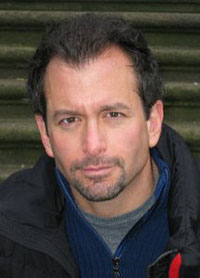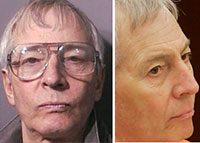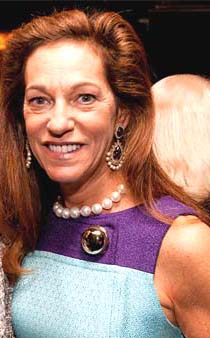“This is probably the one time I can honestly say I reached down somebody’s throat. In order to get the torso out, I had to take my hand down the throat and put my fingers around the breastbone and then pull it out of the water,” Galveston Police Detective Gary Jones graphically explains in the stunning opening sequence of HBO’s six-part docu-series “The Jinx: The Life and Deaths of Robert Durst,” which premiered last night. We subsequently find out that the beheaded, dismembered corpse found floating in the Galveston Bay belongs to Durst’s next door neighbor Morris Black.
Gory and cringe-worthy though it may be, with an opening scene like that, is it any wonder that this series has us captivated from the very first frames?
“A Body in the Bay,” the debut episode in the series, kicks off in 2001 when Black’s body is recovered, and moves into the subsequent investigation and arrest of Durst, real estate scion and brother of Durst Organization chairman Douglas.
The Real Deal was also privy to a sneak peek screening of the second chapter, “Poor Little Rich Boy” which focuses on the early years–Durst’s strained marriage to his first wife Kathleen McCormack Durst, her subsequent disappearance, and his turbulent relationship with his famous family.
Durst, as well as those who surround him, will leave viewers confounded and endlessly frustrated. The first two episodes are chock full of fascinating nuggets about the enigmatic Durst, a person who the show’s producer Marc Smerling described as “an unusual person who does unusual things,” and it seems likely that the remaining four will be equally enthralling. In lieu of a standard review, we picked out the most noteworthy themes to highlight: [SPOILER ALERT]

Director Andrew Jarecki
1) The music: There should be no surprise the music is spot-on. Director and series creator Andrew Jarecki is a musician in his own right, having co-written the theme song to “Felicity.” The theme song here is “Fresh Blood,” performed by the Eels and written by E & Kool G Murder , and nails it in terms of both title and content. What’s even more fitting, though, is that throughout the series, along with a piano, one could hear an eerie musical sound which turns out to be a saw being played by Natalia “Saw Lady” Paruz, a NYC fixture often seen playing her saw in the subways. “The Saw Lady” being commissioned to contribute to a series that centers on a dismemberment by bow saw is rather ironic. Also, while on the subject of irony, Southampton rock group Band of Skulls’ song debuts on The Jinx’s second episode. (Did we mention that Black’s head was never found?)
2) The fashion: Durst wears a series of disguises, including a wig and the persona of woman who was his former high school classmate. Durst’s version of this woman, Dorothy Ciner, is described as a “real ugly, deaf-mute woman” by the lead detective on the case.
 A detective expresses shock that Durst could be so capable of so bloody a crime, saying, “he looks like a librarian; he doesn’t look like a person who’d dismember a human being.” Durst takes on other rather extreme looks, shaving himself bald and espousing the virtues of the jumpsuit. “I never wore a jumpsuit until coming [to prison] here,” Durst explains, saying it is warm and “comfy,” easy to take off and allows him to wear long johns underneath.
A detective expresses shock that Durst could be so capable of so bloody a crime, saying, “he looks like a librarian; he doesn’t look like a person who’d dismember a human being.” Durst takes on other rather extreme looks, shaving himself bald and espousing the virtues of the jumpsuit. “I never wore a jumpsuit until coming [to prison] here,” Durst explains, saying it is warm and “comfy,” easy to take off and allows him to wear long johns underneath.
3) Durst hates real estate: The business that propelled the Durst family to New York royalty never caught Robert’s fancy. Durst and his first wife Kathie lived in Vermont and happily ran a health food store, and he explains he had no intention of coming back to New York. His father Seymour Durst, however, requested his return and he complied. During his deposition, Durst is asked about the family biz. “I had various important sounding titles but didn’t go there much,” he explains. His brother Douglas said Robert “just stopped showing up at the office.” Even with a reported $880 million in property holdings at one time, Robert was unhappy, according to his defense attorney Dick DeGuerin.

Douglas Durst
4) Durst enjoys being reckless: From getting captured because he decides to pick up glasses after Black is killed, to getting recaptured after jumping bail because he stole a sandwich from a local supermarket –even though he had $500 in cash in his pocket and another $37,000 in his car–Durst appears to enjoy doing dangerous things for sport. Last month, though an investigation into McKormack’s disappearance is still open, he admitted that he lied to the NYPD about the events surrounding it. When McCormack’s friends decide to do some sleuthing of their own and pick through Durst’s garbage, they notice that not only has he thrown away her schoolbooks and clothing, indicating he knows for sure she isn’t returning, but they also unearth a list – a virtual recipe for disposing of a body — in his handwriting (The list includes “town dump, bridge, dig, boat, shovel, car, trunk and wrench.”) So is he crazy, or crazy like a fox?
5) Durst is [darkly] funny: While it seems counterintuitive to say that Durst is likable, it appears many fall under his spell, from the jury and defense attorney, to Jarecki himself who discussed Durst’s charm at a recent HBO-sponsored Q-and-A. Throughout the first two episodes, Durst has near-perfect comedic timing and has zings for days. When he is finally captured for the murder of Black, a detective tells him that bail is set at $250,000. When Durst asks him what he should do, the detective snarkily asks if Durst has $250,000. Durst calmly replies, “Not on me.” A day later he is out, leaving detectives reeling.
He reserves his best zinger for his brother Douglas. When he is asked during his deposition why Douglas hired a bodyguard to protect himself against Durst, he snaps back: “Because he is a pussy.”
In another scene, he explains in his Christopher Walken-esque voice that he had trouble dealing with Kathie’s family, saying that Kathie’s mother’s favorite topic of conversation was Yankee Magazine but he was “not interested in discussing canning.” This self-awareness and almost studied acting becomes even more apparent when he discusses with his now-estranged wife, Debrah Lee Charatan, how he should look during his trial. “Am I supposed to be smiling” he asks, “or grim?” Oh Bobby!
6) Names matter: Durst, having been born with a surname that means “to dare, venture and challenge” has, in a twisted sense, certainly lived up to it. The show’s title, “The Jinx,” originated from something Durst calls himself. Durst explains that his first marriage became particularly contentious when he requested Kathie get an abortion because he had always made it clear he didn’t want children. Jarecki asks him why he didn’t want to raise a family to which Durst replies that he felt that if he did he’d be “the jinx” to the children. Where this feeling comes from hasn’t yet been explained, but one could infer that because he claims to have been present at his mother’s suicide at age seven, he feels he has tainted everyone who has any connection with him. He explains that had Kathie not come upon him, she would have had a bunch of children and led a “normal” life.

Debrah Lee Charatan
7) Durst isn’t the only attention-grabber: Aside from Durst, the draw of this show is that the peripheral characters are also fascinating and will evoke emotions from the viewers. Charatan, with her gravelly voice and smart mouth, demanding nature, and fearless attitude, is compelling. She advises Durst while he is in prison, taking every opportunity to add fuel to the fire and prompting his vitriol, imploring him to fire the Durst family-appointed attorney, and many other stunts. The award for most colorful supporting character, however, goes to now-retired NYPD Detective Michael Struk, who was originally called upon to launch an investigation into the disappearance of McCormack in 1982. One can’t help but feel that even if you gave him a videotape of Durst murdering Kathie, he’d find an excuse to disregard it. His ability to turn a blind eye to details of the case seems comical. Several of McCormack’s friends report that she said if anything happened to her to look at Durst, because she feared him. She kept a diary detailing physical abuse, most of which Durst actually admits to on camera. Her friends extract the aforementioned list in Durst’s handwriting from his trash but Struk pooh-poohs it as being insignificant. When the neighbor Durst used as an alibi says refuses to back Durst up, Struk says it is just “an inconsistency” and “the neighbor could be wrong.”
